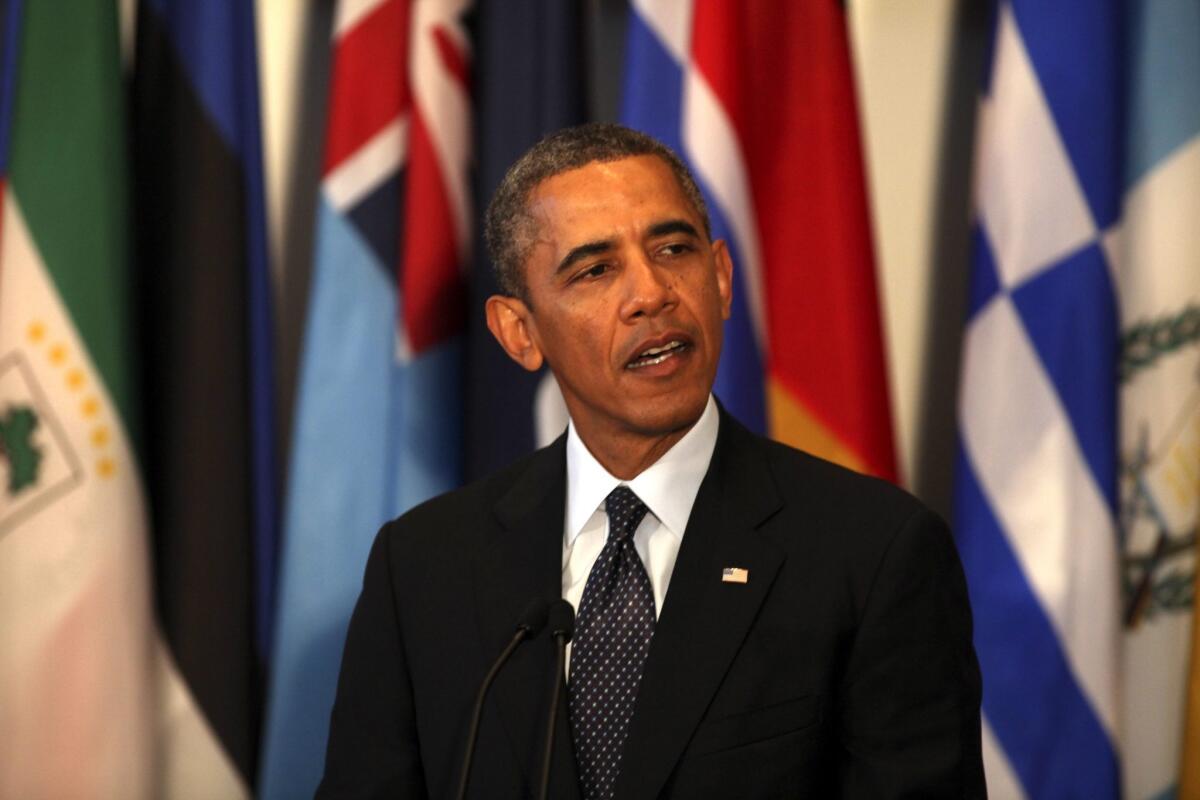Turning away from the Mideast

Two years ago, when the Arab Spring was in bloom, President Obama declared that promoting democracy in the Middle East would be “a top priority” for the United States. “We know that our own future is bound to this region by the forces of economics and security, by history and by faith,” Obama said.
That was then; this is now.
The ensuing years, alas, produced little more than a list of broken dreams. Egypt’s democratic revolution was hijacked by the Muslim Brotherhood and a military coup. Libya’s turned into a chaotic mess. Syria’s turned into a civil war.
And Obama, sadder but wiser, has downsized his ambitions.
At the United Nations last month, he said the United States would now focus on its “core interests,” including the fight against terrorism and the security of oil supplies. Democracy didn’t make the list. Neither did another goal: helping Syria’s rebels push Bashar Assad from power.
Not only that, the president plans to spend less time on the Middle East altogether. “We can’t just be consumed 24/7 by one region, important as it is,” Obama’s national security advisor, Susan Rice, told the New York Times last week.
That sounds a lot like disengagement.
But that’s the wrong way to think about Obama’s shrinking priority list, administration officials insist. “It’s not disengagement,” an administration official told me this week. “It’s a question of what’s doable.”
Last summer, he explained, Obama asked Rice to draw up a list of core interests in the Middle East and to pare it to a minimum, seeking “high-impact moves that could have a transformative impact” in the remaining three years of Obama’s term.
What’s on that high-impact list? Exactly two items. One is Israeli-Palestinian peace talks, although everyone in the administration recognizes they are a long shot. (They probably wouldn’t be on the list if Secretary of State John F. Kerry hadn’t insisted on taking them on.) The other is nuclear diplomacy with Iran, which has been a priority all along because the only alternatives to successful negotiations are nuclear-armed mullahs or war.
At least there are, after a few rounds of talks with Iran’s new president and foreign minister, optimists in the administration who are permitting themselves the luxury of thinking a big strategic opportunity might have arrived.
“Real progress there could ... start to reshape the game,” the official told me — not only a halt to Iran’s nuclear program but a wider opening to normal relationships between Iran and the West.
What’s wrong with this picture?
Obama is surely right to reduce U.S. goals to match the resources he and the American public are willing to commit. And nurturing democracy in the Arab world was always going to be a long and bumpy pursuit. Democracy advocates weren’t surprised when the president publicly downgraded their agenda; they had watched U.S. aid shift from civil society programs to security for more than a year.
But subtracting high-level attention from the Middle East isn’t likely to work. The region reliably produces one crisis after another, whether we give it careful attention or not. The weapons of mass destruction, the civil wars, the terrorists and the oil will still be there.
And announcing we don’t care as much as we used to — even if it’s mostly an attempt to avoid blame when things go wrong — is even worse. When the headline is about the U.S. walking away, it frightens our friends and emboldens our enemies, even if the fine print is more nuanced.
Across the Arab world, disheartened democrats have already concluded that the United States has abandoned their cause. Saudi Arabia and Israel — strange bedfellows — worry that Obama has gone soft on Iran. In Egypt, both sides — the military regime and the Muslim Brotherhood — have concluded that the president doesn’t like them. And in Syria, opposition fighters we once supported are migrating to the jihadist camp, where military supplies are more reliable.
From the start, Obama’s central challenge in foreign policy has been to define what it means to be a superpower in an era when Americans want to spend less money and fight fewer wars. That’s produced an oscillation between enthusiastic engagement — the president’s “outstretched hand” to the Muslim world in 2009, his endorsement of the Arab Spring in 2011 — and bouts of cold-shower realism. The mood swings may have been unavoidable, but they have made U.S. behavior unpredictable and have rattled our allies, many of whom sit atop fragile regimes.
Now Obama and his aides have placed a lot of their remaining chips on the nuclear negotiations with Iran. If those talks fail — and even if they succeed, come to think of it — there will be a lot of repair work to do.
Twitter: @DoyleMcManus
More to Read
A cure for the common opinion
Get thought-provoking perspectives with our weekly newsletter.
You may occasionally receive promotional content from the Los Angeles Times.







